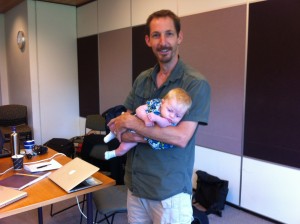
There are a long list of reasons why mobility in an academic career is considered highly desirable, both by individuals and the institutions which fund them. Scientists move around to take up jobs in a tight and international job market, communicate their work to the wider scientific community, work with new people, learn new techniques, strengthen networks or because they like adventure. However, there are many excellent scientists who are constrained in various ways to be less mobile than they would like or than would be good for their careers .
I have always loved to travel, and after almost 15 years of moving around for jobs, fieldwork, conferences and adventure, my own constraints arrived in the guise of two adorable children. My kids have taught me a lot about the benefits of a more sedentary life but I still have itchy feet and the desire to interact with colleagues internationally. This period in my life led me for the first time to really think about what it is about mobility that is of benefit and how to achieve that while staying at home.
Constraints are costly. Some constraints can be overcome by providing resources or altering institutional structures. Other constraints are personal or philosophical and might best be considered as hard constraints (unchangeable). Common constraints include personal family situation such as partner’s career and caring responsibilities for children, parents or friends and personal mental and physical health. The costs of mobility include financial costs, disruption, adaptation to a new scientific and/or social culture, language barriers and leaving a productive group. For all of these reasons scientists may be temporarily or permanently constrained from being able to physically move locations for work reasons.
It makes sense to me to have a range of strategies for getting the benefits while minimizing the costs of mobility. Grant applications sometimes explicitly or implicitly require or evaluate mobility as a proxy for the benefits obtained. If you have had your mobility constrained it might be useful for you in grant applications to articulate what strategies you have used to get the benefits of mobility despite your constraints.
First determine exactly what your constraints are and exactly what activities are constrained. For example do you care for young children which prevents you from traveling overnight for a period of time? Do you need to be in close proximity to healthcare? Determine the boundaries of your constraints. Next estimate the benefits of mobility to your particular situation – the benefits of mobility might be largest if you are currently in a small, relatively unproductive group with limited resources and the benefits of mobility might be much smaller if you are already in a large, productive, well connected (lots of incoming visitors) group.
Determine the costs of mobility: financial, social, environmental and to your productivity. Costs may be larger as you progress through your career but are also more likely to be defrayed through relocation expenses paid or broader networks of colleagues gained. Perhaps for you the costs outweigh the benefits as you are already in the ideal group and don’t want to move because it’s working extremely well for you. Great, but be open minded about additional opportunities to gain additional benefits at low cost.
It is important to recognize that a case for gaining the benefits of mobility may be easier to make with a broad view of mobility. Mobility can be short- or long-term and can be inter-institutional, cross-sectoral, national, international or intercontinental in scale. Many benefits could be gained from doing internships in a different institution or industry but remaining in the same city for example. Below are a few strategies that might be helpful, not all will be possible depending on your situation.
Find a position in a group in your location which is large, productive & well connected. You don’t necessarily have to be employed by them if you can negotiate a day or two a week as a visitor there.
Make use of technology for virtual collaboration – Skype, Adobe Connect, Google hangouts, dropbox, telephone, email, twitter, blogs, Mendeley, Git etc. These require a bit of work to ensure efficacy and avoid the “out of sight, out of mind” problem of not bumping into collaborators in the hallway.
Attend meetings in virtual mode by accepting to give talks but ask to be able to give a video presentation, this is most effective if you can also take part in the discussion afterwards via video conferencing. Ask the organisers to record and send you the video afterwards so you can re-use it. Use twitter to keep up with what’s happening at the meeting if you can’t attend. Tweet and/or blog for others if you can attend in person. I was immensely grateful for the tweeters and bloggers when I was at home on maternity leave and couldn’t attend “my” meetings for a few years.
Attend conferences and extend your network, make sure you gain active collaboration from conference meetings. Be part of international working groups, engage or initiate global research networks.
Develop relationships with potential collaborators via social media, name recognition is important and people will be more inclined to work with you if they have interacted with you positively via twitter/facebook/whatever young people do these days.
Invite visitors to your institution. Find out if there are funds available to help visitors pay for their visit (e.g. visiting fellowships, travel funds if they give a seminar), help visitors apply for these. Paying for a few extra days of accommodation for a visitor if their flight is already covered can be a cost effective way to encourage more interaction. Offer to let them stay at your house. Parasitise sabbatical visitors to other close-by institutions by inviting them to your institution for a day/week/month.
Apply for grants to fund workshops which enable you to run working groups at your own institution and which fund the travel & accommodation of visitors.
If you get invited to present or visit and can’t do it, ask if you can send your student/post-doc/colleague in your place. Make sure you follow up with your proxy to ensure you learn what they’ve learned and if there are outputs of the visit that you can also contribute to.
Lobby funding organisations and institutions to allow your mobility constraints to be taken into account in funding applications and promotion cases (e.g. caring for family members).
Lobby funding bodies and employers to directly fund expenses associated with travel (e.g. extra care for dependents).
Record on your portfolio all invitations to speak/present/take part, even if you have to turn them down as these are useful indicators of your profile and measures of esteem.
Be creative in finding ways to relax your constraints, perhaps you can pay for a grandparent to travel and accompany you on a conference trip as extra child support, perhaps you can take your baby with you to the conference and rely on them to stay quiet enough for you to give a talk with them asleep in a sling, or pass them onto trusted colleagues willing to babysit for half an hour. I took my 2 month old to a workshop, pictured here with Antoine Guisan, where she got passed around several academic alloparents to enable me to contribute to this paper. Perhaps you can afford extra childcare by living frugally while travelling. Be flexible.

Ask conference organisers to make provisions if you need to bring your kid/s with you. For example have a family room with the talks screened via video-conferencing/skype or provide crèche facilities.
Discuss with your partner possibilities for one or both of you to take up part-time work or for your partner to become primary home carer. Move closer to extended family, especially if they are willing to help with caring responsibilities.
Finally, for funders, conference organisers and others who rely on the ability and willingness of scientists to pack their bags and jump on a plane at a moment’s notice, spare a thought for those who are constrained. Provide alternative arrangements for child-care at meetings, provide opportunities for video conferencing, encourage participation and consider evaluating CVs based on what benefits have been gained, not just how many times someone has moved.
Author: Yvonne Buckley, buckleyy[at]tcd.ie, @y_buckley
Image Source







